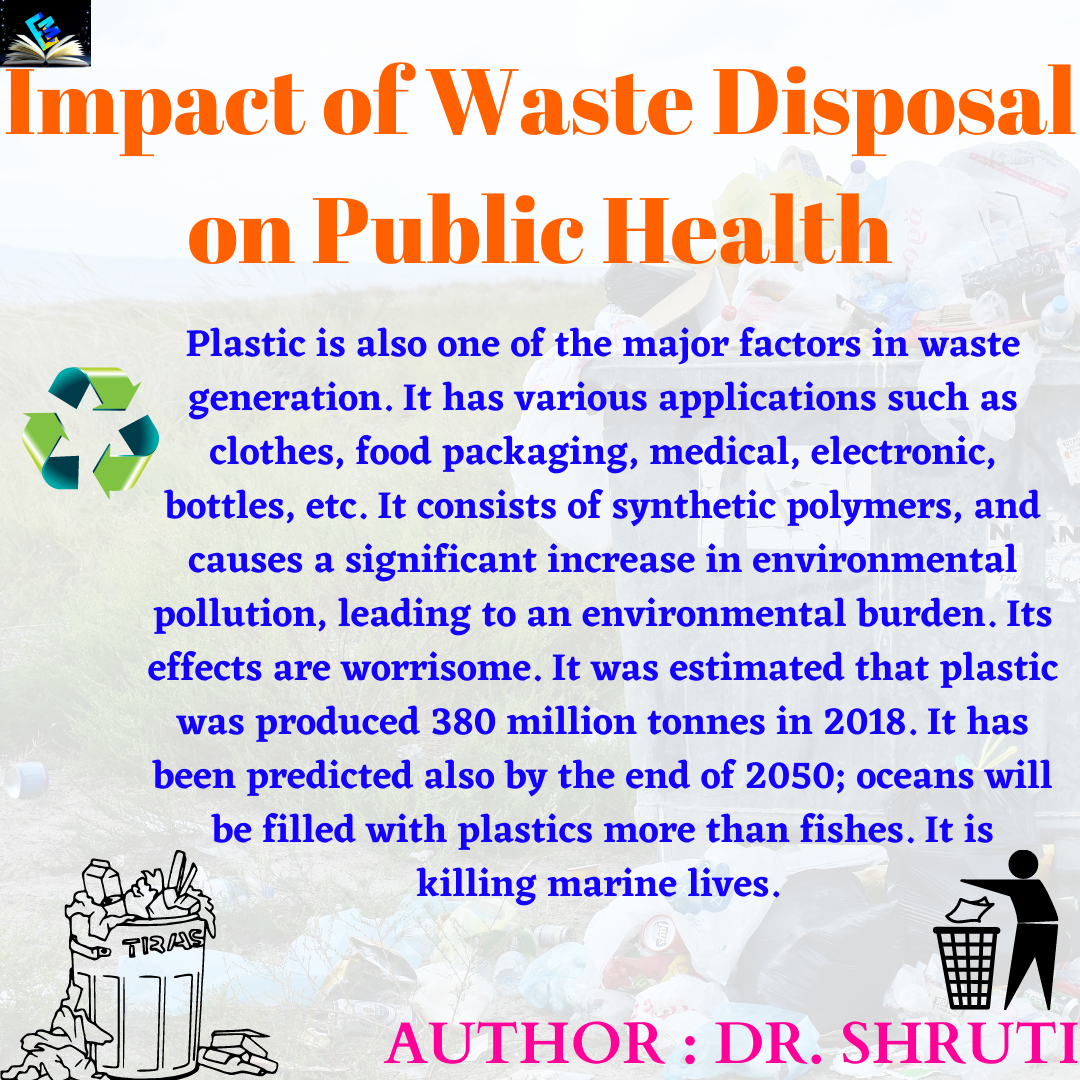
Impact of Waste Disposal on Public Health
Abstract
Plastic is also one of the major factors in waste generation. It has various applications such as clothes, food packaging, medical, electronic, bottles, etc. It consists of synthetic polymers, and causes a significant increase in environmental pollution, leading to an environmental burden. Its effects are worrisome. It was estimated that plastic was produced 380 million tonnes in 2018. It has been predicted also by the end of 2050; oceans will be filled with plastics more than fishes. It is killing marine lives.
AUTHOR : DR. SHRUTI
Keywords:- Waste, Disposal and Health
Worldwide waste is generated at an uncontrolled rate affecting the human and the ecosystem. Waste can be food, construction, mining, industrial, sludge, old televisions, plastic, paper, clothes, furniture, and even health waste, etc. Modernization and innovation are very hazardous, leading to destructive effects on earth-land, the air, water and of course health. As the population is increasing, the rate of generation of waste is also increasing. Ideally waste is collected and dumped into the landfills but due to the negligence of humans only this process is not being followed properly causing serious health effects followed by the affecting environment. Waste dumped into open places has many adverse effects such as climate change, depletion, unwanted chemical reactions, and even global warming due to chemical wastes which generate greenhouse gases. It causes water, soil, and land pollution. Apart from affecting the environment, it leads to an outbreak of both communicable and non-communicable diseases. Some more adverse effects are making fertile land infertile, the spread of germs, harming aquatic life due to toxicity of the water.
Plastic is also one of the major factors in waste generation. It has various applications such as clothes, food packaging, medical, electronic, bottles, etc. It consists of synthetic polymers, and causes a significant increase in environmental pollution, leading to an environmental burden. Its effects are worrisome. It was estimated that plastic was produced 380 million tonnes in 2018. It has been predicted also by the end of 2050; oceans will be filled with plastics more than fishes. It is killing marine lives.
Effects of improper water disposal
- Water Pollution
- Air Pollution
- Soil Pollution
- Health
- Marine Life
- Economy
- Climate
- On a whole, it is killing the planet
Effects on Health
- Solid waste spreads infectious disease, making workers more vulnerable.
- Hazardous wastes make children prone to polluting agents such as chemical wastes.
- Wastes from industries cause negative effects on health. Water from industries causes contamination of water bodies nearby followed by affecting lives such as plants and animals depending on that water-body for their water needs.
- Medical or hospital waste poses a greater risk to health. Wastes such as syringes, needles, bandages, infectious wastes, etc are responsible for creating major health hazards.
- Recycling also causes health issues if not done properly. Workers working with toxic wastes are prone to infections.
Measures required for solid waste disposal
- Incineration – Also known as combustion. It is the most used method for the disposal of wastes. It reduces waste volume by 85-90% by converting waste into ashes or gases. Although burning causes air pollution, filters installed in incinerators capture the gases and help to save the environment.
- Recycling – As the name suggests, it involves the re-use of waste such as cans, metals, steel, bottles, etc. Separate bins are installed in many places to collect recyclable waste separately so that it can be recycled efficiently. This helps us in saving our surroundings. Awareness camps should be arranged more frequently to make the community aware of recyclable products.
- Landfill – It is a low-lying area and is generally located far away from residential areas or places where there is no chance of flooding. This is a very easy method for waste disposal. This method helps to keep the animals away from the buried waste. On the other hand, we should be careful that it will not harm underground water as well.
- Landfill gas – Gases such as carbon dioxide and methane helps in disposing of organic wastes. On the other hand, these gases affect our environment with a hazardous effect called Global Warming but we can control it by lowering the concentration of gases.
On the other hand, waste can be used as a resource also. We can also produce energy by breaking the wastes into substances which can be used by the public in the future such as kitchen wastes if collected properly can be used as a source of fertilizer. Another method of waste treatment called anaerobic digestion produces biogas which can also be used as fertilizer or compost.
Conclusion
Effects of this waste generation are inevitable. Government should state guidelines for proper waste disposal. Some policies need to be implemented to safeguard our environment. There is an urgent need to protect human health and the ecosystem to lead a healthy life as improper disposal of these wastes leads to an outbreak of many diseases. Recycling should be encouraged by both government and private companies leading to financial benefits also.
Mail at info@edumound.com






